Busting Learning Myths: What Really Works for Effective Study
Jul 12, 2022
Many people come to us searching for the answer to the question, “What’s the right way to learn?” First of all, we want to clarify: there is no right or wrong way to study. Still, we can list quite a few misconceptions regarding how the human brain works and what methods can help you memorize material. These are so widespread that it takes time and effort to recognize how unjustified and misguided they are.
That’s exactly how this article will help you.
On this page, we’ve busted all the myths surrounding your learning abilities. Our team has collected all the popular misconceptions about studying and explored why they are inaccurate. Besides, we’ve provided some practical (and time-tested) study tips for you to try out.
🦄 Top 5 Popular Learning Myths
In an attempt to make studying fun and engaging, people often rely on pseudo-science or questionable recommendations from the Internet. However, some myths about learning are so prevalent in our lives that we hear them everywhere. From middle schools to colleges and even workplaces, the number of people who believe in such misconceptions is very high.
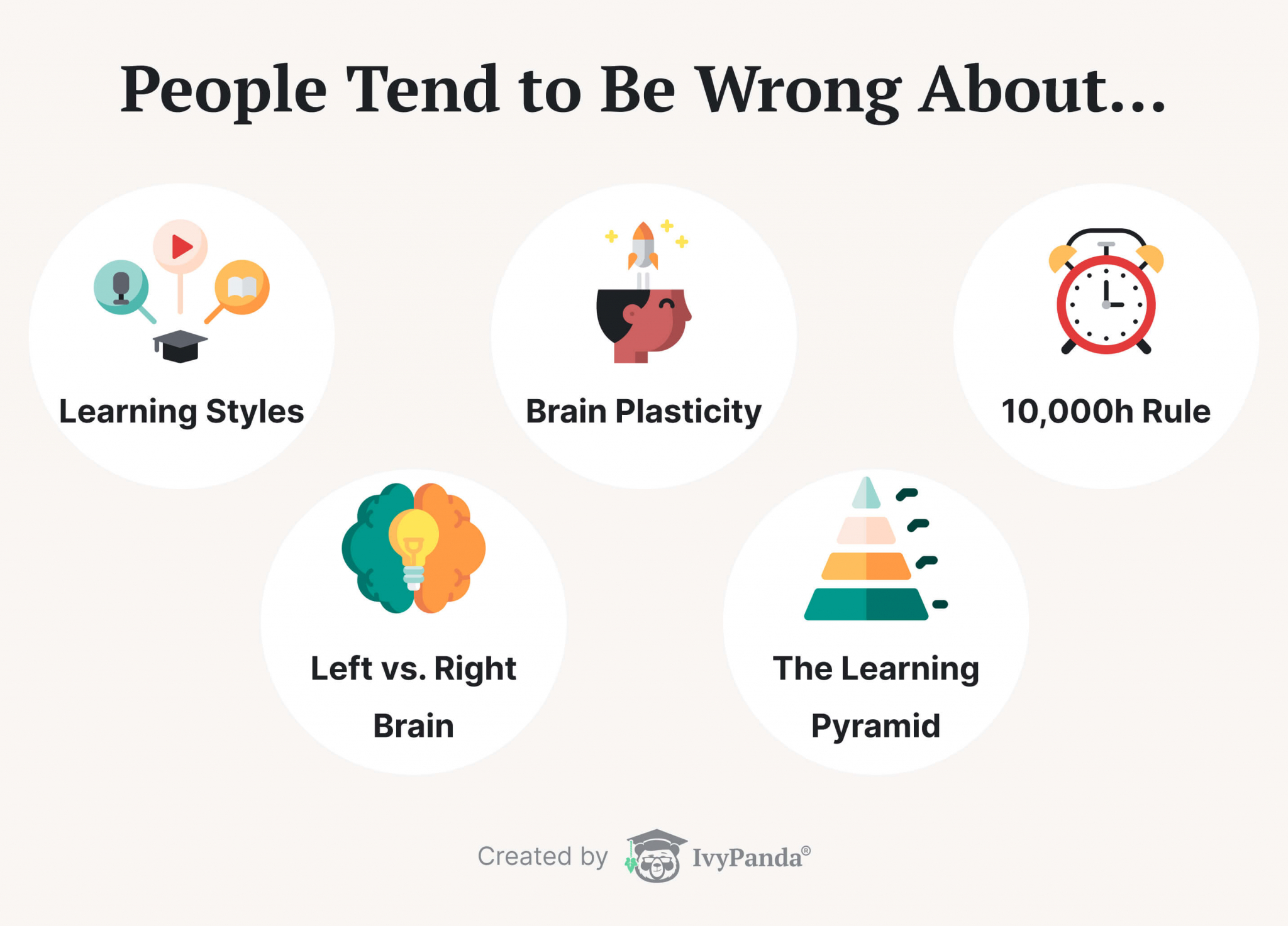
In the sections below, we’ve debunked the most popular learning myths. You can research each case more by following the links or checking out our free college essays.
1. Specific Learning Styles
There is a widespread belief that every person has an individual learning style. Some rely on visual or auditory memory, while others use their reading and writing skills to acquire information. People often believe that they belong to a special learning style and that they need to apply a unique set of memorizing techniques in order to be successful academically.
However, this belief about learning styles is a myth. Researches didn’t find solid evidence to support this theory. Check this study if you aren’t ready to take our words for granted. It shows how the existence of learning styles cannot be scientifically proven. Thus, our cognitive performance does not depend on them.
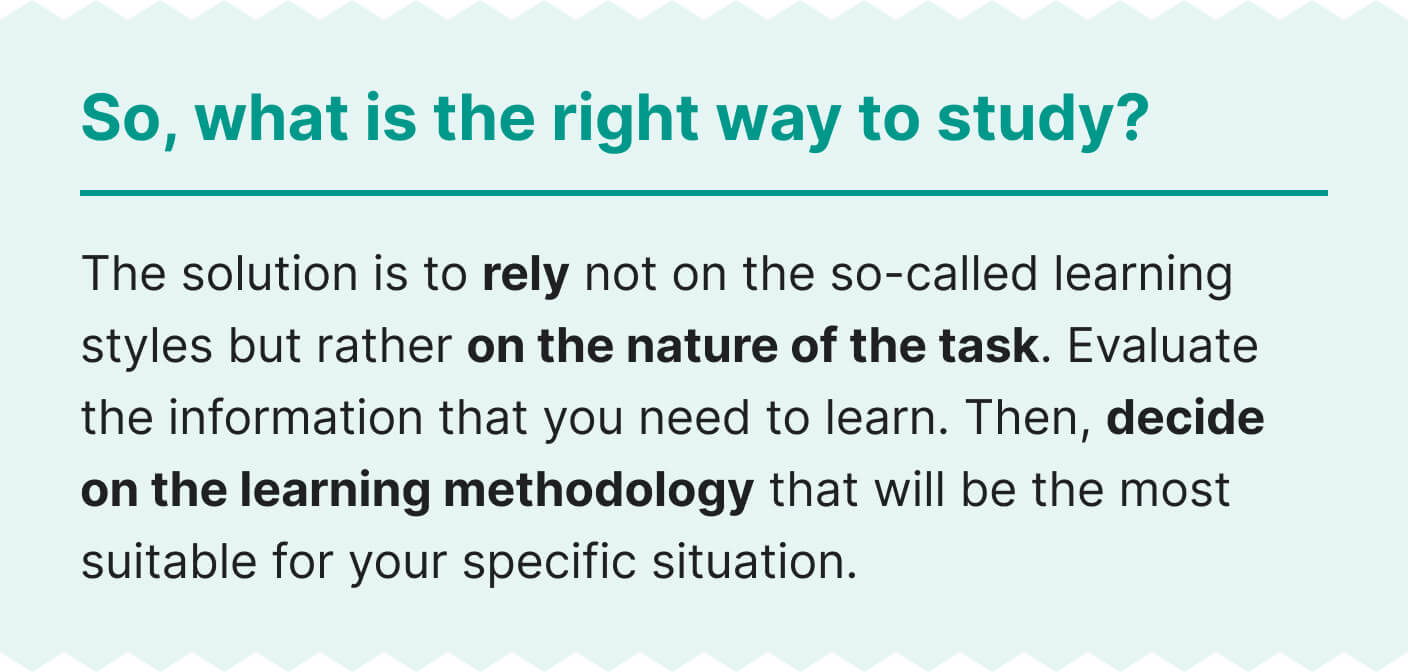
2. Brain Plasticity & Aging
Have your parents or grandparents ever complained that it becomes harder for them to remember information as they get older? Have you noticed that it is much more difficult for older people to keep material in their heads than for youngsters? Well, the truth is that It’s not only about age. Everything is much more complicated.
Most people wrongly assume that brain capacity peaks at a young age and then begins to diminish gradually. However, this scientific study proves that the human brain remains just as powerful as we become older due to brain plasticity. This means that older people are still capable of complex problem-solving and effective information processing.
Of course, there are some distinctive features of an older brain. Let’s discover what older people are capable of and what they struggle with.
In short:
Older adults have a great learning capacity. What’s more, there are some areas in which they are stronger than younger people. For example, older adults have a richer vocabulary. Moreover, they can apply their accumulated knowledge in real-life situations and solve complex problems more effectively.
The Left & Right Brain Debate
The human brain is a very poorly examined part of the body. Previously unknown features and principles of its operation are being discovered regularly. However, there is one thing that scientists do know about the brain without a doubt: there is no division into a “creative” and an “analytical” half.
In other words, many believe that some people are left-brain dominant (aka analytical thinkers) and others are right-brain dominant (aka creative thinkers). According to this myth, people versed in technical sciences cannot also excel in creativity. However, academic research has proven that the division of the brain into “creative” and “analytical” parts is just a myth.

This conclusion leaves us with two pressing questions:
-
How does our brain operate?
-
Why do we have the incorrect assumption that there are “right-brained” and “left-brained” people?
In reality, some tasks require more resources from one hemisphere, while some need the energy from the other. Thus, students will only benefit if they stop making excuses about being “right-brained” or “left-brained.” With a bit of resilience and dedication, everyone is capable of mastering any discipline!
4. The Learning Pyramid
The Learning Pyramid is a theory that relies on false conclusions, speculations, and a complete lack of evidence. So, let’s debunk this myth from its origins.
It all started in 1946 when Edgar Dale, a specialist in audiovisual learning, created his theoretical model called the Cone of Experience. The model demonstrated the channels of imparting information and had nothing to do with knowledge acquisition or retention. Dale’s model was only a theoretical framework and had to be used in different ways depending on the context and external factors.
Later, the Cone of Experience was misinterpreted and renamed the Learning Pyramid. Even though Dale explained the nature of his model and pointed out some possible misconceptions, it was misused. There is no proof to back up the average retention rates presented on the Learning Pyramid.
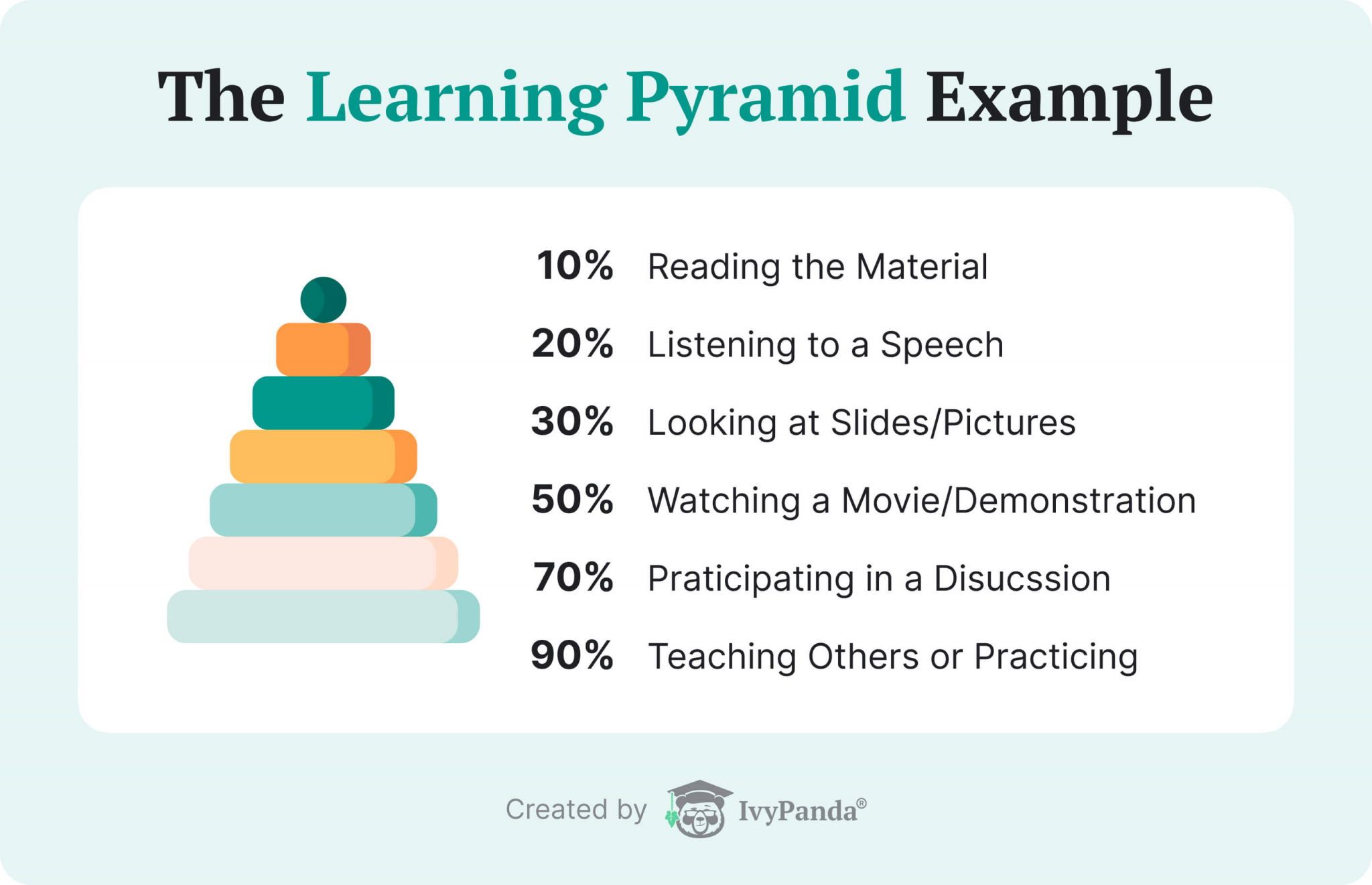
The research explains that no retention percentages can be scientifically proven. The Learning Pyramid is just the result of an unreasonable misinterpretation of Dale’s theoretical framework.
If we investigate the Learning Pyramid on a deeper level, it is worth stating that the retention percentages cannot be proven at all. Initially, many aspects that directly influence memory retrieval have been eliminated. The variables that might affect these rates are as follows:
-
The nature of the material being recalled.
-
The time gap between the studying session and the exam.
-
The age of the learners.
-
The basic knowledge of the learners.
-
The nature of the text.
So, there is no use in relying on the Learning Pyramid!
The best way to study any material is to move the information from passive to active memory. In other words, when you read a book (passive experience) and then take a quiz (active experience), you gain a lot of knowledge. If you rely on the untrustworthy Learning Pyramid, you will see no effect.
5. The 10,000-hour Rule
It takes about three days to reach the Moon, nine months to carry a baby, and 10,000 hours to become an expert in some field, right? Not quite. Let’s discuss the last one and why it’s incorrect.
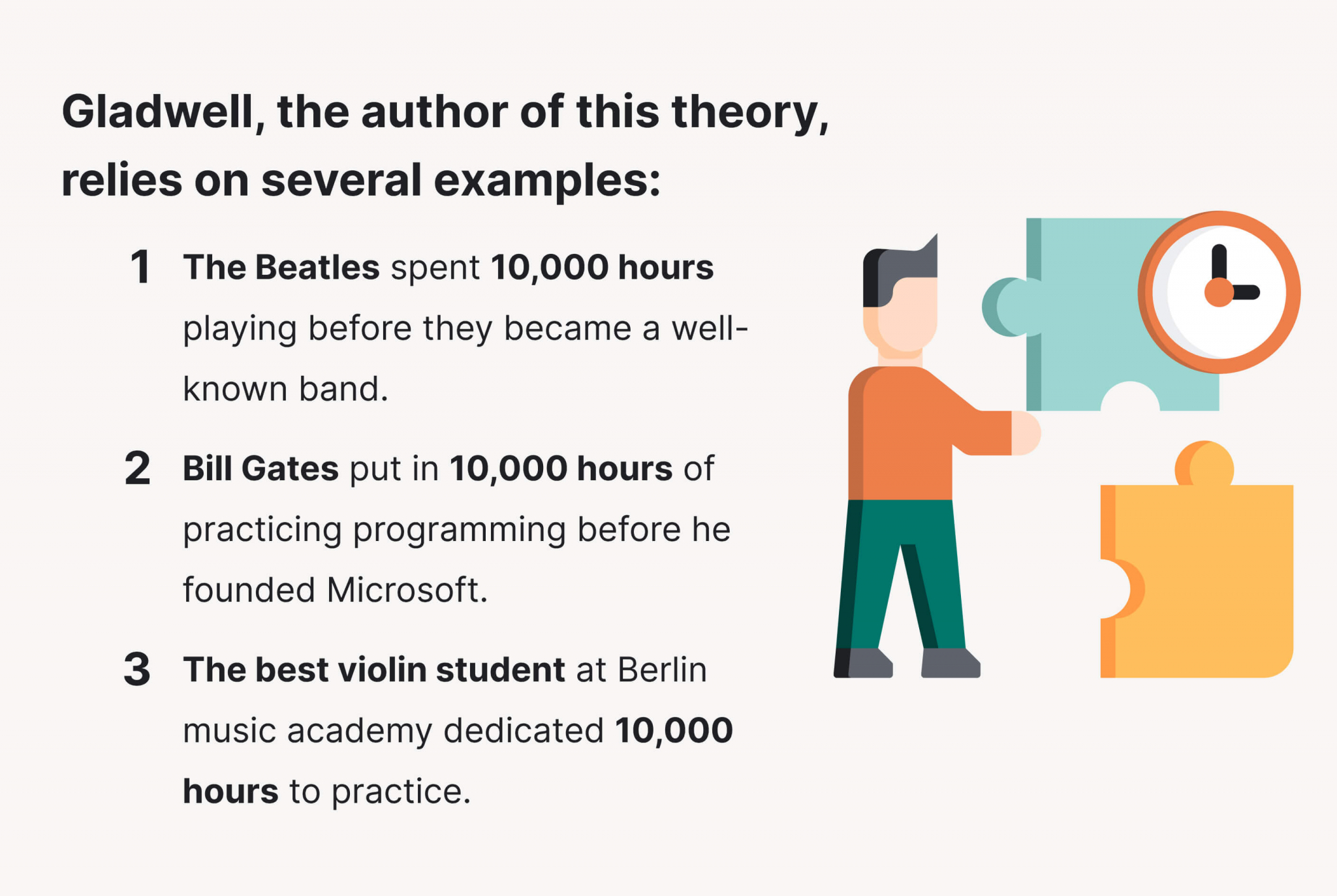
But is this theory reliable? Not really.
Firstly, the number 10,000 is very catchy, of course. But it is entirely arbitrary, and there is no substantial evidence to prove that this number is based on scientific research. Secondly, Gladwell misunderstood that in the case of the music academy, 10,000 hours was just an average. In fact, half of the best students put in less time.
As with The Learning Pyramid, the whole idea is based on false generalizations and misunderstandings of other people’s theories. After all, when it comes to practice, you need to remember two main points:
-
Quality matters. The simple repetition will not bring a lot of value to the practice. To get better, a learner should perform the activities recommended by the experts to develop a particular set of skills.
-
Does practice indeed make perfect? Yes, but it isn’t the sole component of success. The researchers argue that deliberate practice is overestimated. Other factors, like age and genetics, play an essential role in acquiring skills and knowledge.
Overall, you cannot predict how many hours, days, or years you will need to become an expert. Or whether you become one at all. Yet, you can practice consciously relying on quality advice!
✨ Learning Myths That Can Work
Of course, there are a lot more study myths that we can dwell on. So, we’ve decided to talk about something more helpful.
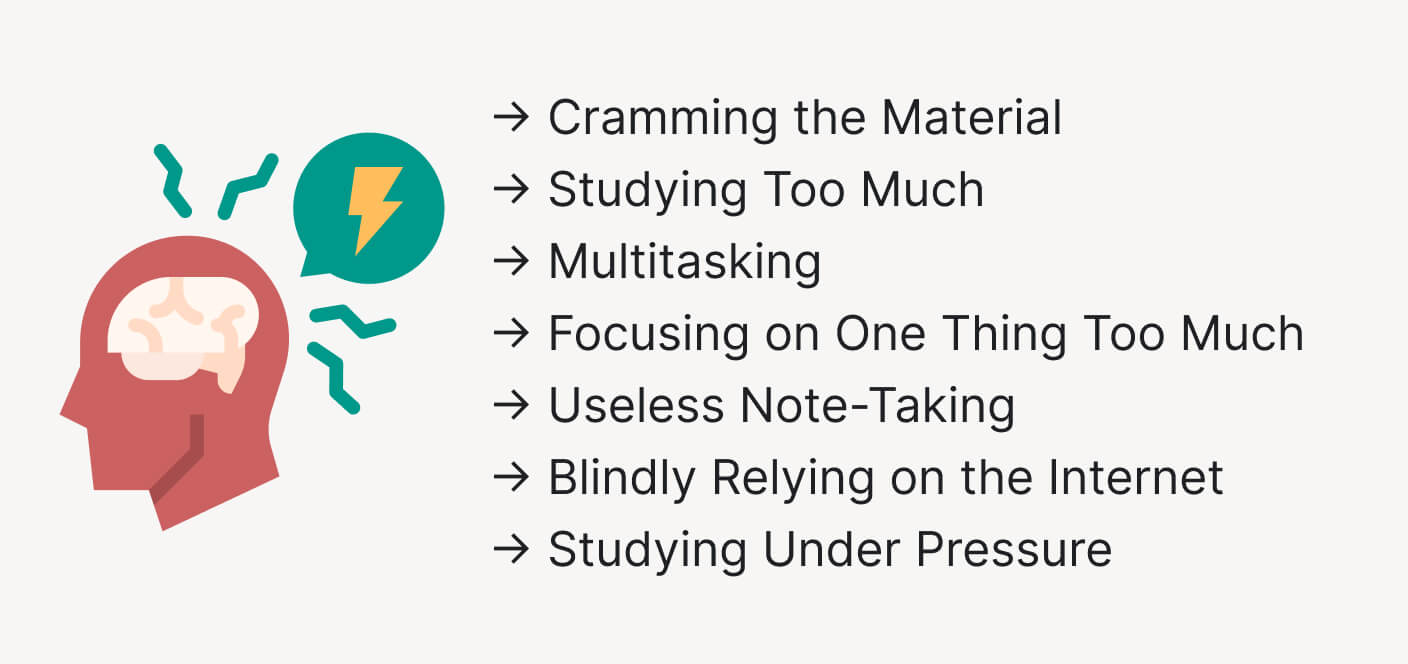
We’ll explore what learning myths can work in combination with other techniques below.
6. Cramming the Material
One of the most popular study myths is that cramming is effective. According to this idea, learning plenty of information at once will be beneficial as it keeps the material fresh in your brain.
Nevertheless, researchers suggest that memorizing many things the night before an exam or test won’t work. Instead of retaining information, cramming creates a sense of familiarity with the material. In fact, spacing out your studying is by far a more effective method.
What Can I do About It?
If you were to do well in the exam, don’t leave studying for the last day. Yet, in case you have no other option, here are some tips on doing it correctly:
7. Studying Too Much
You might believe that there is no such thing as too much studying. However, scientists claim the opposite. Students who don’t take sufficient breaks tend to burn out. The consequences of this state can be very harmful to their physical and mental health.

What Can I do About It?
Listen to your body and learn to realize when to take a break.
Your school, college, or university does not expect you to study all day and night. Instead, they want you to treat your degree as a full-time job. In other words, try to study about 35-40 hours per week.
In your free time, don’t blame yourself for getting rest. Your body needs to recharge throughout the day, so help it do so. Meet up with friends, go for a walk, read books for fun, watch TV, and treat yourself!
8. Multitasking
If you believe you know how to multitask, we are happy for you. Yet, according to studies, simultaneously completing different tasks lowers your productivity and efficiency. Our brains can only concentrate on one activity at a time.
Some find doing simple physical activities helpful in memorizing information. For example, this study suggests that combining exercises with mental tasks can improve the memory of older people. However, other researchers reveal that even talking on the phone while walking can be harmful:

In other words, we don’t recommend multitasking.
What Can I do About It?
Thankfully, there are numerous activities that will allow you to exclude multitasking from your study process. Here are some of them:
9. Focusing on One Thing
If you think it is beneficial to focus on a single topic or subject until you excel at it, you aren’t right. It’s the same issue as with multitasking – you might think that it’s the only way, but your brain will quickly get bored or tired.
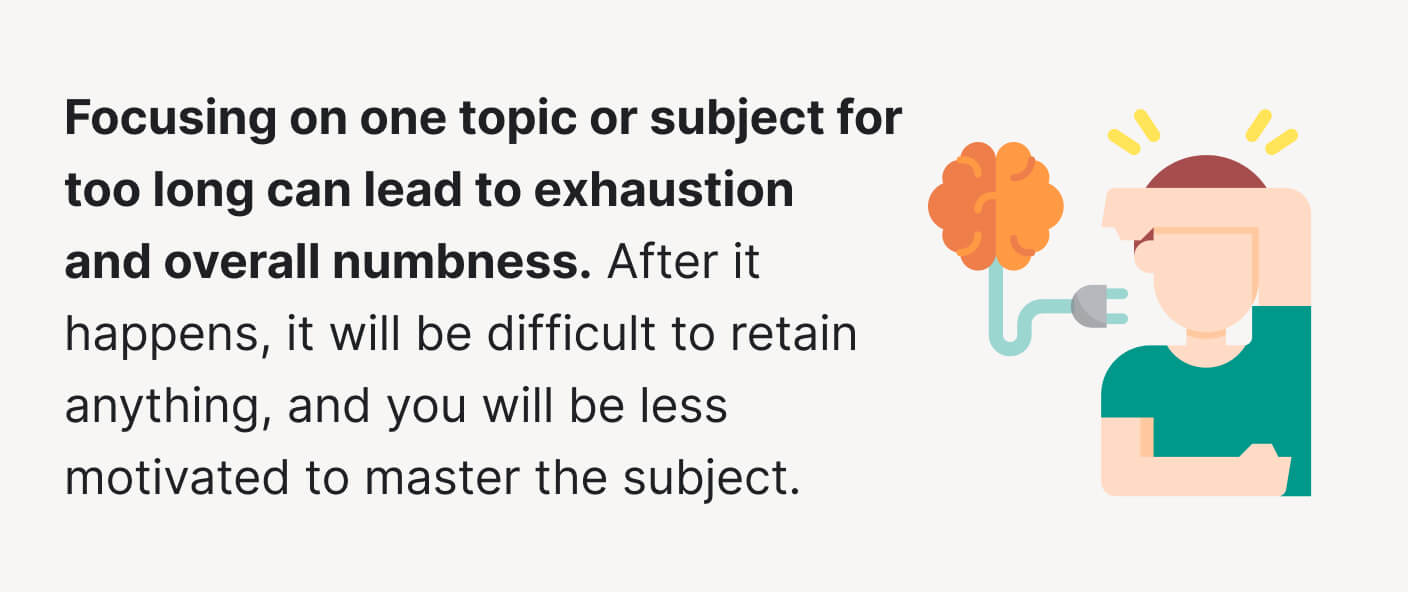
What Can I do About It?
This advice might seem obvious, but it does not make it less effective: plan ahead.
Plan how much time you can spend on each task and focus on each particular activity. You can revisit different topics when you need it but try not to linger on a single concept for too long. Instead, if you have trouble understanding something, work on something else. It will allow you to take a break and return to the challenging topic with a fresh perspective.
10. Useless Note-Taking
Some students believe that note-taking is useless. It is usually done in a rush, so your handwriting may look indecipherable. Besides, can you actually benefit from scribbling something when hurry?
Yes. Yes, you can.
Effective note-taking can help you succeed in your studies, mainly when you write everything down by hand. By rephrasing what you’ve heard from your professor, you absorb the material better as you make your brain work harder. Plus, you can organize the information how you’d like, highlight the essential facts, and gather similar concepts.
What Can I do About It?
There are quite a few note-taking strategies we can share with you but let’s look at the essential tips instead:
-
First, don’t write down every word you hear. You might miss what the teacher means and wants you to understand, so try to paraphrase what you’ve heard.
-
Second, take notes by hand. Research proves that this old-fashioned method helps students to learn the material.
-
Third, revisit your notes. Deciphering your handwriting and recalling what you’ve learned during the lecture will let you retain information with ease.
-
Forth, recopy your notes if you can’t understand what you’ve written. Do it as soon as possible because it will help you recall the material later.
-
Fifth, don’t be afraid to ask if you don’t understand something. You can question your tutor or classmates after the class in case you can’t interrupt the lecture.
11. Relying on the Internet
The Internet is a powerful tool, and you can find almost everything you need there. Yet, solid research skills are required to find the correct information. There is no tutor or advisor to guide you through the mountains of data, avoid misinformation, and explain the material. You may also struggle to identify which source is reliable and relevant to your task.
In other words, the Internet can both facilitate and complicate the study process. You can depend on it only when you understand how to use it correctly.
What Can I do About It?
Indeed, to find reliable information on the Internet, you need to figure out what can be qualified as disinformation. Here is what you need to look at while researching a topic or studying for an exam:
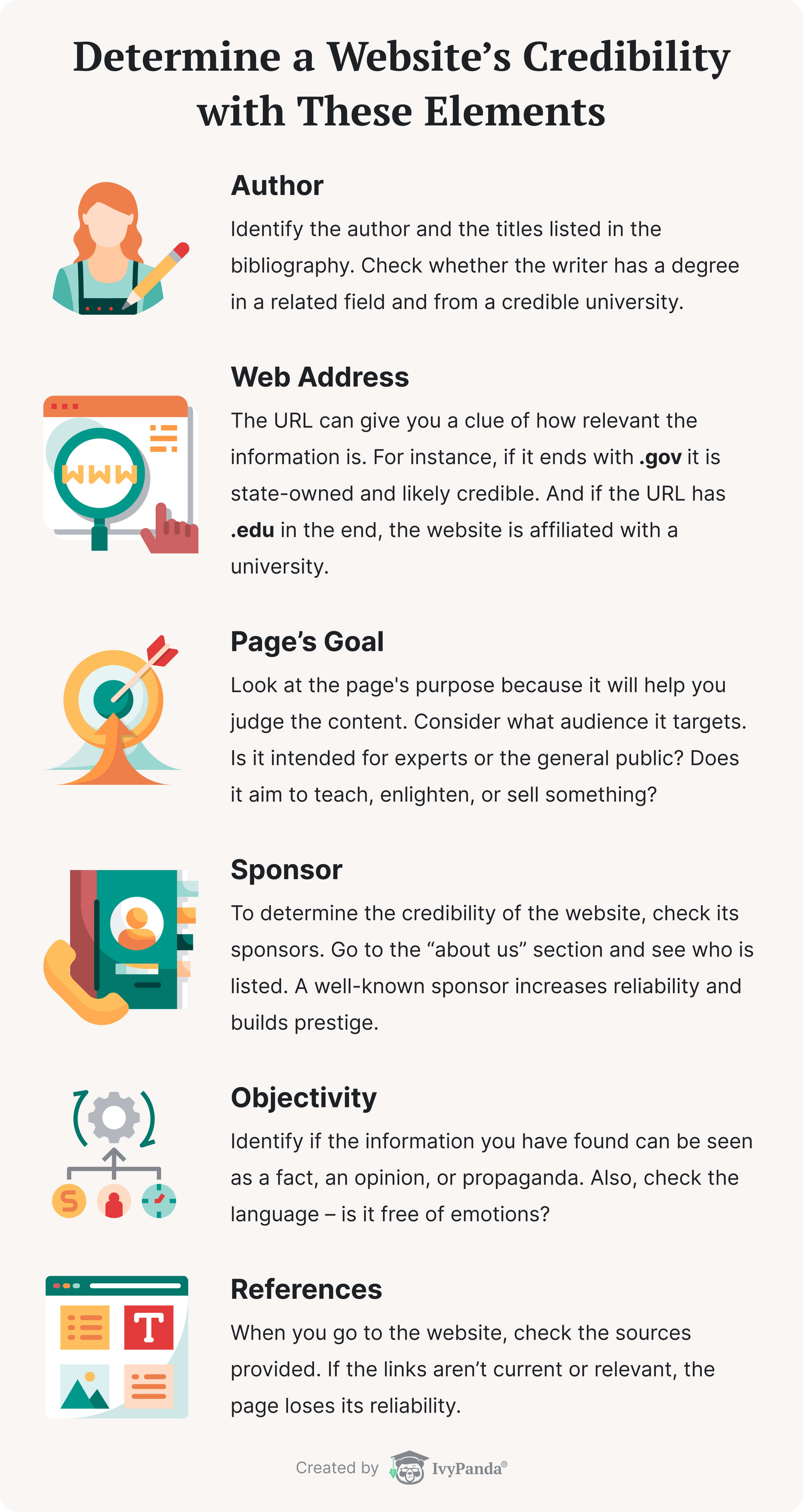
12. Studying Under Pressure
Writing a paper just before the deadline or studying at the last minute may seem like a good idea or the only way. However, letting your procrastination control your schedule proves harmful and ineffective. It can be the only option for some students with ADHD, but the method isn’t healthy.
It works similar to cramming that we’ve discussed above. Studying under pressure gives you a sense of familiarity with the material but doesn’t let you retain data or dive into the topic. If you try to review your notes or skim the required textbooks each week, you will absorb a lot more information. Discussing the material with your classmates or study group from time to time will also help you more than studying at the last minute.
What Can I do About It?
As we’ve said already, we don’t recommend writing a paper all night to submit it in the morning or preparing for the exam on the last day. Nonetheless, if it’s your only option, here is what you can do:
💡 9 Tested & Effective Study Tips
After busting all of the study myths, you will likely want to find out which tips are actually effective. Are there any evidence-based suggestions that any student can use? Thankfully, there are!
Here are some time-tested methods to improve your learning process:
-
Exercise. It’s not a secret that sport is good for the body – however, it is incredibly beneficial for the mind. Plenty of published studies suggests regular exercise can improve memory retention. It also increases your blood flow and feeds the brain, improves your mood, and lowers stress levels. Spend half an hour exercising before your study session to become more alert and ensure your learning process is efficient.
-
Try spaced repetition. When you force yourself to learn too much information in a single sitting, it rarely goes as planned. Eventually, exhaustion will overtake you. Research has shown that it is much more effective to space out your learning process. If you want to remember new information better, break it into smaller parts. Revise them regularly over a longer period.
-
Start with challenging tasks. Students tend to focus on the easier assignments first, leaving the harder ones for later. This approach may seem effective in the short term, but it will eventually hurt your academic performance. In fact, studies suggest that by starting with more complex tasks, you create more opportunities to learn.
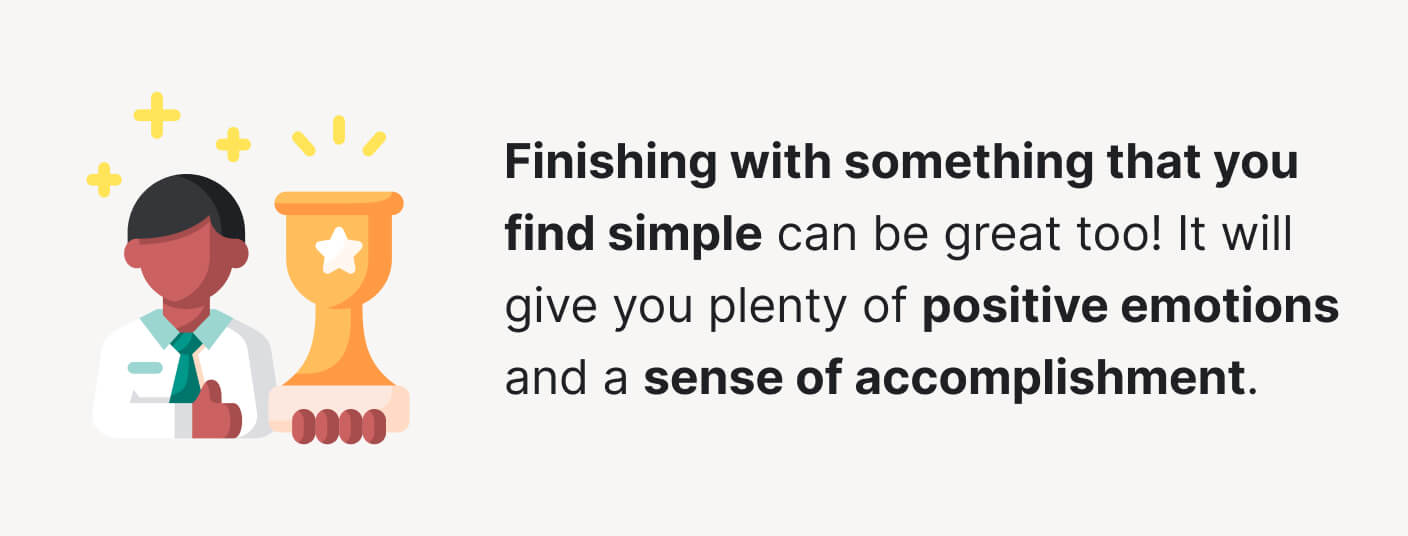
-
Learn as if you will teach. There is evidence that shows students become much better at retaining material when they study with the intent to teach someone else. After all, when you have to explain a concept to another person, you approach it from a different angle. You automatically begin to sort through the information, thinking about how to make it clear and concise. You don’t have to teach anyone for this method to work. Just explain a topic to a friend, your dog, or even a stuffed animal – you might just make it clearer for yourself!
-
Listen to music. As some studies have found, this method might not work for everyone, and not every genre is effective for learning. However, a significant number of students find listening to music essential during a study session. After all, a correctly chosen playlist can improve your cognitive abilities and overall performance.
-
Get a print textbook. As convenient as tablets are, they may not always be the best alternative to a paper book. Research shows that a person’s reading comprehension is higher when they hold a printed text rather than any digital e-reader. The difference isn’t particularly drastic. Yet, this might just be the extra push you need.
-
Recall and recite what you’ve read. Students often spend their time reading and rereading the same passages repeatedly. They mistakenly assume that this is enough to retain the information. However, studies of the brain suggest that we learn much better when we actively recall the things we have studied.
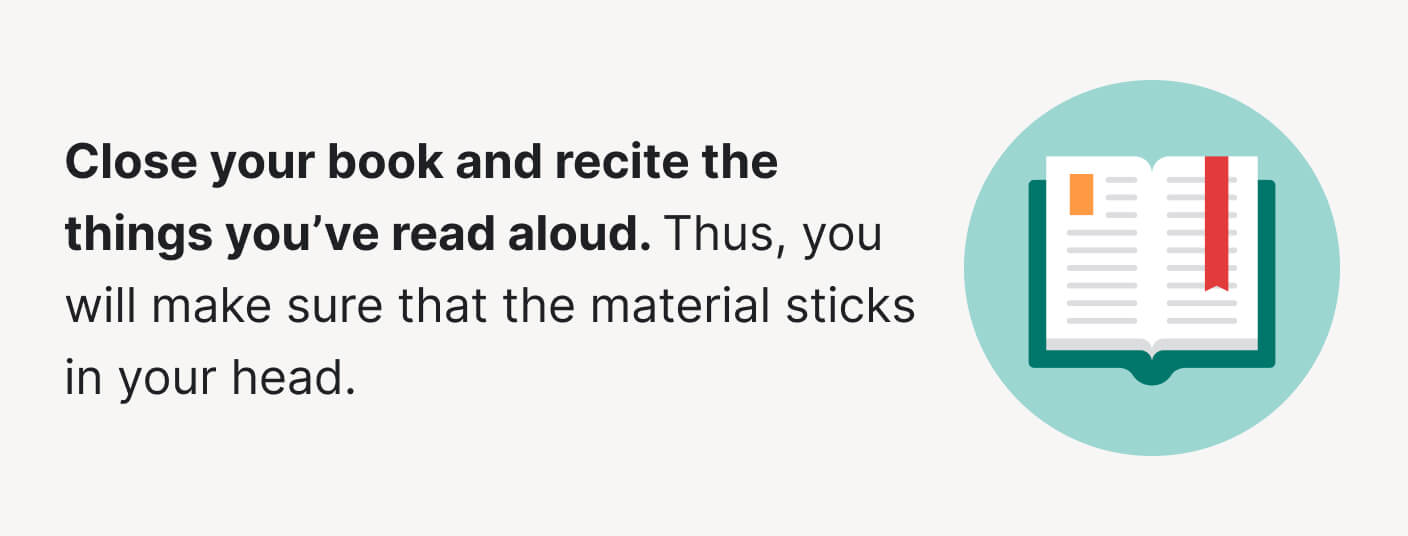
-
Assess your skills and knowledge. Taking a self-assessment test is essential for several reasons. For starters, it allows you to see whether you are on the right track. Assessing your knowledge will tell you if the study methods you use are effective. Besides, the new information becomes more vivid in your mind after you test yourself. And finally, research shows that self-assessments increase your motivation and achievements overall.
-
Connect the dots. If you want to become more efficient, you need to draw associations between different ideas. Evidence suggests that “connecting the dots” (in your mind or literally, on a chalkboard or paper) allows students to see the broader image. It helps link all the topics together. In other words, this process encourages you to tailor your study methods, categorizing information so that it makes sense to you.
Thanks for reading! To sum up, every person is capable of learning. Using many different methods can improve your learning speed and quality. So, good luck with that! If you think our myth-busting article can help someone else, send them the link.

